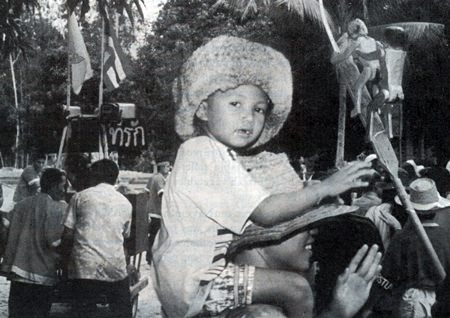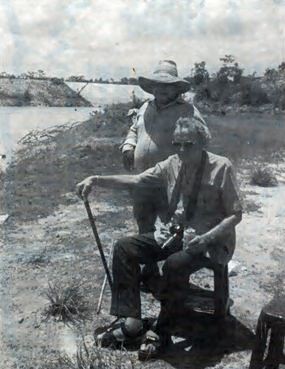
It is prudent to be prepared, in case of a cold
spell.
A Thai historian friend told me that in the days long ago, in the nineteenth
century, Burmese and Indian traders, called Kulau, would enter the lands of the
Thais from the west and roam the country in order to sell their textiles,
utensils and trinkets to the indigenous people. Some wandered as far as Cambodia
and others ventured into the central part of the vast plains of Isarn in the
Northeast. The latter country they found desolate, dry and hot. The local people
had no money to buy their merchandise, the travelling was arduous, the sun
merciless and the rains would not come. One day, an exhausted and starved trader
sat down on the side of a dusty trail under a gnarled tree for a rest. He looked
at the scorched landscape, the glaring sky as well as his tortured feet. It was
then that he despaired and started to cry uncontrollably. Some peasants found
him in this sorry state and took pity. They quenched his thirst, fed him their
meagre fare and let him rest. Then they sent him on his way, back to the lands
of plenty at the big rivers in the East where he was more at home. Ever since,
that part of Isarn is known as the “the dry plains where the Kulau wept”, or in
Thai, “Thung Kulau Rong Hai”. This is poetically, but erroneously, translated
into English as the “Weeping Plains of Isarn”.
When I arrived in Thailand more than thirty years ago, I explored the country
from the north to the south and also the west, but whenever I expressed my
desire to visit the Northeast as well, my Thai friends in Bangkok tried to
discourage me. They told me that Isarn was a backwater, the people were
unreliable and stupid, only good for unskilled labour. There was simply nothing
in those barren lands to be of interest for me. At first I believed them but as
they had told me the same about the south of the country, which I had found
fascinatingly beautiful and very interesting, I started to wonder after a while
if these negative reports were fair and unbiased.
Unfortunately at that stage I went through a period of little time for travel
and it wasn’t until the mid-seventies that I was able to visit the north-eastern
provinces. Although the country is mostly flat and at times monotonous, it is
the people of Isarn which makes a visit for anybody interested in the real
traditional ways of these lands an absolute must. No phoney cultural shows
promoted by a government only interested in the culture and the religion of
money. No revivals of dull lifeless classical dances for the benefit of tourists
and the pockets of the “entrepreneurs”. Only spontaneous manifestations of joy,
by the people and for the people.
At the end of May we travelled in a cavalcade of five pick-up trucks and our own
van, up-country again to the “Weeping Plains” (see also Pattaya Mail, June 28,
1995) for a yearly reunion in the village which adopted me as a honorary citizen
many years ago. After I had told a friend of mine about the yearly extravaganza,
she flew in from Holland for the occasion and as one can see from the
illustrations, had a whale of a time.
Many of the younger villagers are working in the city of Bangkok, as well as in
Pattaya, and for the occasion, besides our own private transportation, three
large tour buses are rented to get them all to the village in the province of
Yasothorn. Once there, everybody makes merit, celebrates and donates small sums
of money to a project for the benefit of the whole community. At present this is
a large “chedi” or “stupa” to be build in the temple grounds. This project will
probably take us about ten years. When there is money available, work is done
but if not, it can wait. It is reminiscent of the mediaeval churches which often
took hundreds of years to finish for the same reasons. After the joyous
procession to the temple to present the collected fund to the abbot, which was
this time almost 200,000 Baht, we danced, ate, drank and caroused, while the
last day, when many of the youngsters had already left for their jobs in Bangkok
and Pattaya, was reserved for a fishing picnic at the reservoir outside the
village.
 The
author and Loong Goon, a village elder watching the fishing in the mid day sun.
The
author and Loong Goon, a village elder watching the fishing in the mid day sun.
While I was sitting there in the wilderness near the large lake, consuming small
freshly caught grilled fish and sticky rice, I contemplated that for hundreds or
even thousand of years people there must have done this same thing. But for the
modern garments and the numerous pick up trucks of Japanese make, nothing must
have changed very much since ancient times. These country people may not a have
a Mercedes Benz or a BMW in their front yard or millions of Baht in the bank,
but they do have something which may be even more precious and certainly more
durable. Mostly uneducated people, they have an intrinsic inherited culture
which I admire. They have traditions which go back into the mist of times,
nobody knows for how many hundreds of years and values (and I do not mean Mr.
Mahatir’s self serving so called “Asian Values”) which are still valid in their
not always paradisiacal world. I also envy the fact that these people belong.
This is something I, regretfully, am not able to claim for myself. Most of the
people in the village are related and have known each other for generations.
Families use each other’s houses as their own, they raise each other’s children
when necessary, which gives the children a sense of security. They know there is
always family to fall back on when mother and father are too busy or tragedy
strikes, and when one family has a celebration everybody joins without proper
invitations as it is just a matter of course that, when one has no other
business on hand, one is welcome. Of course this is not always so and I realise
that my village is one of bliss, compared with some other hamlets where there is
discord and ill feelings among the citizens.
A final note. I would like to point out that the Northeast is not always dry and
devoid of trees. On the contrary, the surroundings of the village are quite lush
and I have weathered several tropical rainstorms among the greenery over the
years.

